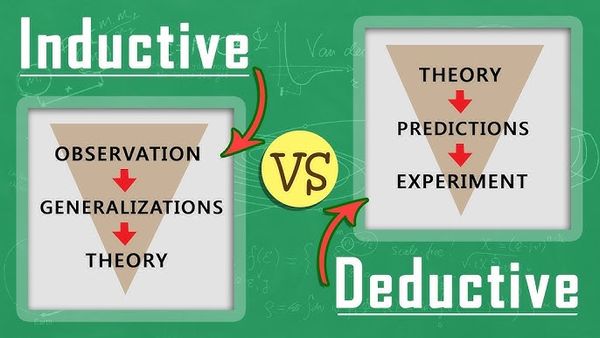Introduction to Inductive and Deductive Reasoning

We will learn about how to use deductive and inductive reasoning in the real world
Oct 24, 2024
Introduction
Deductive and inductive reasoning are fascinating because of the multiple similarities and differences. You can use them in the real world to prove things and predict observations. In this blog, we will learn about deductive and inductive reasoning and find ways to use them in the real world.
Deductive Reasoning
Aristotle created deductive reasoning, which is building specific ideas from general ideas. He created this method to show if a statement follows from other statements or not. This way is supposed to guarantee a logically correct conclusion. This method of reasoning evolved in Ancient Greece around 400 B.C.E. An example of deductive reasoning is if you know “if it is raining, the ground is wet,” and you also know, “it is raining right now,” then you could conclude that, “the ground is wet.”
Inductive Reasoning
Francis Bacon created inductive reasoning, which is creating general ideas from specific ideas. This way is supposed to give a statement which has a high probability of being true, given the observations. We use this method to make reasoning general instead of taking specific instances. This method of reasoning evolved around the early 1600s A.D. in England. An example of inductive reasoning is from "leaf falling", "rock falling", and "apple falling" to conclude "everything falls".
Comparision
The inductive and deductive reasoning both complement each other, which means that all the weaknesses in one reasoning, will be a strength in the other reasoning. While deductive reasoning is better if you want to be very accurate and guarantee conclusions from assumptions, inductive reasoning is better if you want to generalize from specifics, but might lose accuracy.
Usages
You can use deductive and inductive reasoning in many subjects like science and math. In math, axioms for a topic are found using inductive reasoning, while theorems which are derived from axioms use deductive reasoning to get there.
In science, you can observe nature and create assumptions like gravity affects all the objects. These assumptions can be used to build theories, whose predictions about the world are tested, and we change the assumptions based on observations of the tests. Assumptions to theory use deductive logic while observations to assumption use inductive logic.
Conclusion
Inductive and deductive reasoning complement each other, and have been foundations of the scientific revolution, which led to the creation of computers among other things you are reading this on right now!